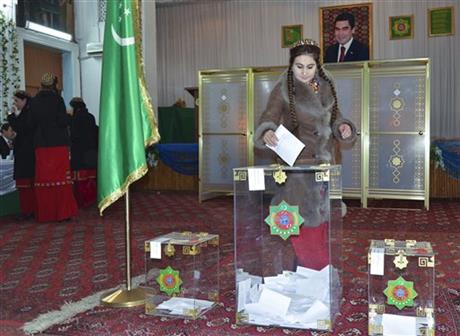
A Turkmenistan woman dressed in traditional clothes casts her ballot at polling station during parliamentary elections in Ashgabat, Turkmenistan, Sunday, Dec. 15, 2013. Voters in the energy-rich Turkmenistan are casting ballots in a parliamentary vote that for the first time features several parties, all of them loyal to the Central Asian nation’s autocratic leader. (AP Photo/Alexander Vershinin)
ASHGABAT, Turkmenistan (AP) — The energy-rich Turkmenistan held its first multi-party parliamentary elections Sunday, but all the contenders swore loyalty to the Central Asian nation’s autocratic leader.
President Gurbanguli Berdymukhamedov has described the elections as a landmark stage in the ex-Soviet country’s democratic development, while Amnesty International has called them a sham.
Earlier this year, Berdymukhamedov stepped down as leader of the Democratic Party, a move he said should encourage democracy. The pro-business Party of Industrialists and Entrepreneurs created in 2012 also pledges loyalty to Berdymukhamedov, as do three other groups taking part in the vote.
Berdymukhamedov, nicknamed Arkadag (the Protector), has run Turkmenistan with an iron fist since 2006, controlling all aspects of life in the mostly Muslim nation of five million people that borders the Caspian Sea.
Turkmenistan, which boasts rich natural gas reserves estimated to be the fourth largest in the world, has been the subject of intense rivalry for influence between the West, Russia and China.
Berdymukhamedov, a 56-year-old former dentist, came to power after the death of his eccentric predecessor, Saparmurat Niyazov.
Niyazov, Turkmenistan’s former Communist leader, was celebrated in a bizarre cult of personality that saw cities, streets, months, periodicals and public organizations named after him and his family members. Niyazov also made a two-volume spiritual tome he wrote mandatory reading.
Berdymukhamedov, meanwhile, has maintained the authoritarian leadership style of his predecessor, allowing no dissent or independent media and becoming the subject of adulation that also bears the hallmarks of a personality cult in the mostly desert country the size of California.
During the election campaign, state television broadcast footage of candidates speaking in support of the government’s course and meeting with voters in rooms adorned with portraits of the president.
In Sunday’s election, 283 candidates are running for 125 seats in the national parliament, which has served as a rubber stamp for Berdymukhamedov.
About 90 percent of eligible voters cast ballots in the vote, the Central Election Commission said.
“We have a big holiday today: for the first time the new Party of Industrialists and Entrepreneurs is taking part in the parliamentary elections,” Makhym Annamukhamedova, a textile factory worker said after voting in the Turkmen capital. “I think it is a big step forward for democracy.”
Amnesty International described the elections as window dressing.
“Holding these elections will not address the atmosphere of total repression, denial of the basic human rights, and the all-permeating fear that has gripped society in Turkmenistan for years, and all pretense of progress on human rights is simply deceitful,” John Dalhuisen, the group’s Europe and Central Asia program director, said in a statement. “There is still no genuine opposition party, no independent media and not a single independent human rights organization operating freely inside the country.”
The Organization for Security and Cooperation in Europe, the top trans-Atlantic security and rights group, for the first time sent a mission to assess if the vote meets international standards, but it will not conduct a comprehensive observation of the voting, counting and tabulation. It promised to issue a final report in two months.



